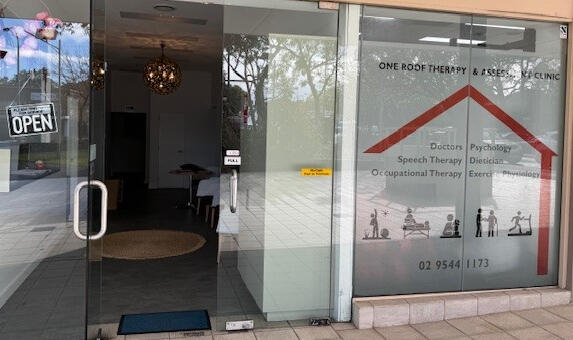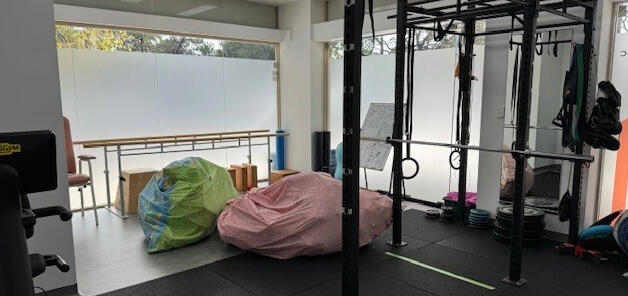Therapy & Assessment Clinic
A multidisciplinary diagnostic and assessment clinic for children and adults
located in Caringbah and Shellharbour

About
Clinics are located in Caringbah and Shellharbour and specialise in the Diagnosis and Assessment of Children and Adults.Our clinics are NDIS registered and offer a comprehensive multidisciplinary service including Occupational Therapy,
Speech Pathology , Psychology and Exercise Physiologists.
Contact
ONE ROOF THERAPY & ASSESSMENT CLINIC
Caringbah Office:
Shop76 (opposite 155 Willarong Rd Caringbah)
360 Kingsway
CARINGBAH NSW
tel (02) 95441173
E: [email protected]E.C.P.C EARLY CHILDHOOD PLAY CENTRE
Shellharbour Office:
Shop 110B (at Stockland Shellharbour)
211 Lake Entrance Road
SHELLHARBOUR CITY CENTRE NSW 2529
tel (02) 42951173
E: [email protected]
Developmental Paediatrican
Dr Bindu Baburaj
Dr Baburaj is a paediatrician specializing in developmental and behavioural issues in children. During an assessment Dr Baburaj will usually conduct the following:Initial Consultation: The assessment often begins with an initial consultation where Dr Baburaj gathers information about the child's medical history, developmental milestones, family history, and any concerns or observations from parents or caregivers.
Developmental Screening: Dr Baburaj may conduct developmental screenings using standardized tools to assess the child's developmental progress in areas such as language, motor skills, social interaction, and cognitive abilities.
Physical Examination: A physical examination may be performed to assess the child's overall health and to look for any physical signs or abnormalities that may be relevant to their developmental issues.
Behavioural Observation: Dr Baburaj will observe the child's behaviour during the assessment, looking for signs of developmental delays, social difficulties, attention problems, or other behavioural issues.
Diagnostic Evaluation: If warranted based on the initial assessment, Dr Baburaj may recommend further diagnostic testing or evaluations to better understand the child's developmental challenges. This could include psychological assessments, speech and language evaluations, occupational therapy assessments, or genetic testing, among others.
Collaboration with Other Specialists: Dr Baburaj will often work closely with other specialists, to provide a comprehensive evaluation and develop a tailored treatment plan for the child.
Feedback and Recommendations: Following the assessment, Dr Baburaj will provide feedback to the parents or caregivers and discuss their findings, diagnosis (if applicable), and recommendations for intervention or support services. This may include therapy, educational interventions, behavioural interventions, medication management, or referrals to other specialists or community resources.
The goal of assessment is to identify any developmental delays, disabilities, or behavioural concerns early on so that appropriate interventions can be implemented to support your child's development and well-being. It's important for parents and caregivers to actively participate in the assessment process and to follow through with any recommended interventions or follow-up appointments.
Paediatric Occupational Therapist
Blanche Kairies
Holly Scheepers(Allied Health Assistant) and Beatriz Rebelo (Allied Health Assistant)
Paediatric occupational therapy focuses on helping children develop the skills they need to participate in everyday activities or "occupations" that are important to them. These activities may include playing, learning, self-care tasks (such as dressing and feeding), socializing, and participating in school activities. Here's what typically happens during OT:Initial Evaluation: The therapy process usually begins with an initial evaluation, where the occupational therapist (OT) assesses the child's strengths, challenges, and areas of need. This evaluation may include standardized assessments ie Griffiths II, ADOS or Sensory Processing Measure; observations, interviews with parents or caregivers, and discussions with other professionals involved in the child's care.
Goal Setting: Based on the evaluation findings, the OT and the child's family collaborate to establish goals for therapy. These goals are tailored to the child's individual needs and may focus on improving specific skills such as fine motor coordination, sensory processing, self-regulation, social skills, or activities of daily living.
Therapeutic Interventions:
Sensory Motor Integration therapy to help regulate sensory input and improve sensory processing abilities; DIR Floortime techniques; SAS Secret Agent Social Skills Program; SOS Feeding Approach for Picky Eaters .
Fine motor activities to improve hand-eye coordination, dexterity, and handwriting skills.
Gross motor activities to improve balance, coordination, and body awareness all provided in a exclusive Sensory Gym .
Self-care activities to develop independence in tasks such as dressing, grooming, and feeding.
Play-based interventions to promote social skills, creativity, problem-solving, and emotional expression.
Parent/Caregiver Education and Training: Parents and caregivers play a crucial role in supporting their child's progress outside of therapy sessions. Our OT will provide education and training to help parents understand their child's needs, implement therapeutic strategies at home, and create supportive environments that facilitate skill development.
Collaboration with Other Professionals: located under One Roof our team frequently collaborate with the other professionals involved in the child's care at our clinic. This interdisciplinary approach ensures that the child's needs are addressed comprehensively and that interventions are coordinated across disciplines.
Progress Monitoring and Reassessment: Throughout the course of therapy, the OT monitors the child's progress toward their goals and makes adjustments to the intervention plan as needed. Periodic reassessment may be conducted to evaluate progress, identify new areas of need, and modify treatment goals accordingly.
our OT's aim to support children in achieving their full potential and engaging fully in their daily activities, whether at home, school, or in the community. By addressing underlying skill deficits and providing individualized support, occupational therapists help children develop the confidence and abilities they need to thrive.

Paediatric Speech Pathology
Claire Markey
Our Paediatric speech-language therapist, focuses on assessing and treating communication disorders in children. These disorders may involve difficulties with speech sounds, language development, fluency (stuttering), voice, or social communication skills. Here's an overview of what typically happens during speech therapy :Initial Assessment: The therapy process usually begins with an initial assessment, during which the speech-language pathologist (SLP) evaluates the child's communication skills and identifies areas of concern. This assessment may include standardized tests, informal observations, parent/caregiver interviews, and collaboration with other professionals in our team or otherwise involved in the child's care.
Goal Setting: Based on the assessment findings, the SLP and the child's family collaborate to establish goals for therapy. These goals are individualized to address the child's specific communication needs and may focus on improving speech clarity, language comprehension and expression, social communication skills, or other areas of concern.
Therapeutic Interventions: Speech therapy sessions may include:
Articulation therapy to help improve speech sound production and clarity.
Language therapy to develop vocabulary, grammar, comprehension, and expressive language skills.
Fluency therapy to reduce stuttering and improve speech fluency.
Voice therapy to address voice quality, pitch, volume, and resonance.
Social communication therapy to improve pragmatic language skills, including turn-taking, initiating and maintaining conversations, and understanding social cues.
Play-Based Approach: a play-based approach, where therapy activities are designed to be fun and engaging while targeting specific communication goals. Play allows children to practice communication skills in a naturalistic and motivating context.
Parent/Caregiver Involvement: Parents and caregivers play a crucial role in supporting their child's progress outside of therapy sessions. Sessions will often include education, training, and home-based activities to help parents reinforce therapy goals and promote communication development in everyday situations.
Collaboration with Other Professionals in our team and feedback directly back to our Developmental Paediatrician onsite This One Roof interdisciplinary approach ensures that the child's communication needs are addressed comprehensively and that interventions are coordinated across different settings.
Progress Monitoring and Reassessment: Throughout the course of therapy, the SLP will be monitoring the child's progress toward their goals and adjust the intervention plan as needed. Periodic reassessment may be conducted to evaluate progress, identify new areas of need, and modify treatment goals accordingly.
Our SLP aims to support children in developing effective communication skills that enable them to participate fully in social interactions, academic activities, and daily routines. By addressing communication challenges early and providing individualized support, speech-language pathologists help children build the foundation for successful communication and lifelong learning
Paediatric Psychology
Anna Shewan (Clinical Psychologist)
Holly Scheepers (Social Work Student)
Specializes in providing psychological assessment, diagnosis, and treatment services to children and adolescents. Typically, the psychology service includes:Initial Assessment: to obtain background information including family background, developmental history, child's temperament, strengths and difficulties, and areas of concern, and may include specific diagnostic questions as required. Typically , this is a parent interview through teachers, and other professionals may be consulted.
Standardised assessment tools including the Autism Diagnostic Observation Schedule, second Edition( ADOS-2), Autism Diagnostic Interview Schedule - Revised (ADI-R), developmental assessment - Griffiths III, cognitive/intellectual assessments - Wechsler Pre School & Primary Scale of Intelligence, Fourth Edition (WPPSI- IV), Wechsler Intelligence Scale for Children Fifth Edition (WISC-V), academic learning assessment - Wechsler Individual Achievement Test, Third Edition) (WIATT III) and various Questionnaires may be used depending on the referral question to assess the child's social, emotional, behavioural, cognitive/ intellectual or learning ability.
Diagnostic Formulation; Based on assessment findings a diagnosis is provided (if acceptable) and a report that may include the child's strengths, challenges and treatment needs is provided either at the follow-up with our psychologists or the child's Paediatrician.
Therapeutic Interventions: Depending on the child's age, a developmental level and needs evidence based interventions may include Cognitive Behaviour therapy (CBT) for Children who are anxious or depressed - focusses on identifying, challenging and replacing negative thoughts with more positive thoughts; aspects of Dialectical Behaviour (DBT) that teaches children to identify and regulate their emotions, tolerate distress and communicate effectively or Acceptance & Commitment Therapy (ACT) that uses mindfulness and acceptance techniques. Therapy games are frequently included. Play based therapy to facilitate emotional expression, problem-solving and social skills. Emotional Regulation strategies. Social Skills Training to help children develop interpersonal skills, navigate social situations and build peer relationships. Strategies to assist with bullying. Parent Support in managing challenging behaviours, improving child-parent relationships and fostering healthy dynamics.
Adults Services may include Autism Diagnostic Assessment, Social Skills and therapy to assist with anxiety and low-level mild depression.
Paediatric Exercise Physiology
Luke Kairies
Brittany Johnston
Our exercise physiology focuses on understanding the physiological responses and adaptations to exercise in children and adolescents.
Assessment and Testing: A variety of assessment tools and tests are utilised to evaluate the cardiovascular, respiratory, metabolic, and musculoskeletal systems in children and adolescents. These assessments may include:
Fine Motor and Gross Motor Assessments using Standardised Test to identify co ordination or muscle tone problems.
Cardiopulmonary exercise testing (CPET) to evaluate cardiovascular and respiratory function during exercise.
Muscular strength and endurance testing to assess muscle function and fitness levels.
Body composition analysis to measure fat mass, lean mass, and bone density.
Functional movement assessments to evaluate movement patterns, flexibility, and motor skills.
Exercise Prescription: Based on the assessment findings, the exercise physiologists will develop individualized exercise program to promote physical fitness, improve health outcomes, and enhance athletic performance in children and adolescents. These exercise prescriptions are supported in our Gym Space and fosters an engaging and age appropriate interaction with gym equipment.
Strength training to build muscular strength, power, and endurance.
Flexibility exercises to improve range of motion and prevent injury.
Balance and coordination activities to enhance motor skills and functional movement.
Exercise Programming involves the design and implementation of exercise programs that are developmentally appropriate, safe, and enjoyable for children and adolescents. These programs are tailored to meet the specific needs and goals of individuals with chronic health conditions, or those seeking to improve overall fitness and well-being.
Monitoring and Supervision: During the exercise sessions children are monitored closely to ensure safety, proper technique, and appropriate intensity levels and are provided feedback, encouragement, and support to help individuals stay motivated and engaged in their exercise programs.
Education and Counseling: to educate children, adolescents, parents, and caregivers about the importance of regular physical activity, healthy lifestyle behaviours, and injury prevention strategies. They may also provide guidance on nutrition, hydration, sleep, and stress management to support overall health and well-being.
Research and Advocacy: Our Peadiatric exercise physiologists contribute to the University of Wollongong undergraduate program aimed at advancing prospective EP's understanding of exercise physiology in children and adolescents
Our Paedatric exercise physiology plays a vital role in promoting the health, fitness, and well-being of children and adolescents through evidence-based assessment, exercise prescription, programming, education, and advocacy efforts.

Dietician
Position Vacant
Specializing in providing nutrition assessment and education to infants, children, and adolescents.
Nutritional Assessment: The process usually begins with a comprehensive nutritional assessment, during which the information about the child's dietary intake, growth patterns, medical history, feeding behaviours, and any nutritional concerns are gathered. This assessment may include measurements such as height, weight, body composition, and growth charts.
Dietary Counseling and Education based on the assessment findings, to promote optimal nutrition and overall health in children and adolescents. This may involve:
Providing guidance on age-appropriate nutrition, including breastfeeding, formula feeding, introduction of solid foods, and transitioning to a varied and balanced diet.
Addressing specific nutritional needs or concerns related to growth and development, chronic health conditions, food allergies or intolerances, gastrointestinal disorders, eating disorders, or sports performance.
Nutritional Intervention and Support to address specific nutritional deficiencies, imbalances, or health goals in children and adolescents.
Incorporating nutrient-dense foods, such as fruits, vegetables, whole grains, lean proteins, and dairy or dairy alternatives, into the child's diet.
Providing support and guidance for families navigating complex nutritional issues or challenging feeding situations.
Nutrition Education for Families about nutrition-related topics, including the importance of early nutrition, healthy eating habits, meal planning and preparation, food safety, and feeding practices that promote positive relationships with food.
Collaboration with our Paeditricain to provide integrated care and support for children and adolescents with complex nutritional needs or medical conditions.
Regular follow-up appointments may be scheduled to assess compliance, track growth and nutritional status, and address any emerging concerns or challenges.
Overall our Paediatric dietitian plays a crucial role in promoting optimal nutrition and healthy eating habits in children and adolescents, supporting their growth, development, and overall well-being.
RMS OT Driving Assessments and Vehicle Modifications
Blanche Kairies
is a RMS registered Medical Driving Assessor for all medical conditions and is also a Qualified Driving Instructor specialising in driving lessons for young adults with neurological conditions and ASD.
Occupational therapy (OT) driving assessments evaluate an individual's ability to drive safely and independently. These assessments are often recommended for individuals with physical, cognitive, or sensory impairments that may affect their driving skills.
Pre-Assessment Interview: The process usually begins with a pre-assessment interview, during which the occupational therapist gathers information about the individual's medical history, driving history, current functional status, and any concerns or limitations related to driving. This interview helps the therapist understand the individual's specific needs and concerns.
Clinical Evaluation: to assess the individual's physical, cognitive, perceptual, and psychosocial factors that may impact their ability to drive safely.
This evaluation may include:
Physical assessment: Evaluating strength, range of motion, coordination, and mobility.
Cognitive assessment: Assessing attention, memory, problem-solving, and executive function.
Visual-perceptual assessment: Evaluating visual acuity, visual processing, depth perception, and visual attention.
Psychosocial assessment: Exploring factors such as motivation, confidence, anxiety, and emotional well-being related to driving.
On-Road Evaluation: If deemed appropriate based on the clinical assessment, the individual may undergo an on-road evaluation, where they drive a vehicle on public roads while the therapist observes their driving performance. The therapist evaluates the individual's ability to demonstrate safe driving behaviours, follow traffic laws, anticipate hazards, and make appropriate decisions while driving.
Vehicle Adaptations and Modifications: If the individual requires adaptations or modifications to their vehicle to drive safely, we may assess the suitability for specific equipment or adaptive devices, such as hand controls, pedal extensions, steering wheel modifications, or wheelchair lifts. Recommendations for vehicle modifications are based on the individual's functional abilities and specific driving needs.
Recommendations and Driving Rehabilitation: Based on the assessment findings recommendations are tailored to the individual's needs. This may include recommendations for further training, vehicle modifications, restrictions on driving, or alternative transportation options. In some cases, the individual may benefit from participation in a driving rehabilitation program, where they receive additional training and support to improve their driving skills with the OT for driving lessons
Overall, OT driving assessments play a crucial role in helping individuals with disabilities or impairments maintain or regain their ability to drive safely and independently, while also ensuring the safety of themselves and others on the road.
NDIS Accounts Officer
Kylie Mc NairOur NDIS Officer plays a key role in supporting individuals and families navigating the NDIS process offering:
Information and Guidance: helping participants, their families and caregivers about the NDIS, including application process and available supports and services. Clarification of any questions or concerns is offered to ensure that individuals using our service understand their options and choices.
Assistance with NDIS Access and navigating the planning process. This may involve helping individuals gather necessary documentation, complete the access request form.
To ensure that individuals needs, preferences, and goals are accurately represented in their therapy sessions by collaborating with our therapists .
Assist individuals in identifying the services available as outlined in the NDIS plan
Offer to help individuals understand the review and appeals process, gather relevant information and evidence.
Collaboration with professionals with in our team involved in supporting the individual with disabilities and their families throughout their NDIS journey with us.

